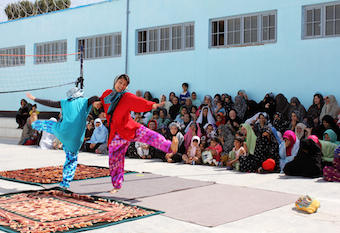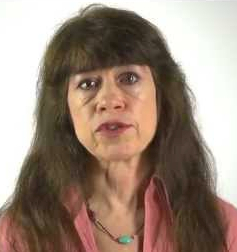
Afghanistan presents many challenges, and equal opportunities
Many Dining for Women members and constituents raised questions about what would happen to the women supported by the Bond Street Theatre program when they are released from prison or once the US leaves Afghanistan. We posed these questions to Bond St.’s artistic director and founder, Joanna Sherman. Her answers are thoughtful and thought-provoking.
By Joanna Sherman
Artistic Director, Bond Street Theatre
Our work directly helps the women find their own strength so that they can make choices for themselves. We can’t solve all the problems that women face in Afghanistan (or anywhere), but these women have been so debilitated by their circumstances that they first have to rediscover their “personhood”. Having been told their entire lives that they live only to serve the needs of others, they have to learn that they are valuable, smart, able, talented, empathetic human beings and deserve to be alive. This first step is essential if they are going to survive. You are so right — empowerment first, then change can follow.

What happens when they get out? This question has been asked frequently and, of course, the situation is not perfect. Again, we can’t solve all problems at once. If working in Afghanistan has taught me anything, it’s patience! Working in countries that suffer from extreme poverty, injustice, corruption, violence, etc. is tremendously frustrating — it’s not for the faint of heart. But, as the women in Dining for Women well know, we can’t give up — we have to stick together and patiently accomplish what we can. And even small gestures have tremendous impact!
Organizations and governments from around the world have created a wide network of women’s shelters, just as they have greatly improved the prisons. The prisons are no longer like dungeons, and the women aren’t terrified of rape from male guards as they had once been. Most of the shelters are locally run at this point although regularly funded by foreign NGOs. There could be a danger if the government decides to take over the shelters, but right now, they are doing a great job. There are a few other options for the women: they may move in with a sympathetic relative or even a friend’s family. So far, it’s not appropriate for women (or for men) to share an apartment as we do here. However, in Kabul, I’ve noticed that the idea of apartment-sharing is just starting among college women. Hopefully, this trend will continue.
The children do receive an education. If they are school aged, they go to school during the day and return to the prison. Yes, the stigma may follow them — such is true everywhere — but we will be providing the same kind of healing and empowering workshops for the children, and activities that the mothers and children can do together. At age 7, the family usually will take the boys — the girls may face a more difficult choice. Again, it’s a slowly changing situation, but we see that by doing this creative, empowering work with the children (both boys and girls), and with their mothers, they will enter the world stronger, braver, and with the tools to express themselves and speak out.
About sustainability… we have been working with a group of young women in Herat, Simorgh Theatre, since 2011. The US actor-educators will go to Herat to continue training the Simorgh girls with a focus on their new challenge: working in the prison system. These young women have already performed in the Women’s Prison, the Juvenile Correction Center, and in a few of the shelters, so they are prepared for the environment. For the first month, we will be there with the girls, co-teaching, in the Prison and Juvenile Centers, and with the children, with a full daily schedule. After that, the Simorgh group will continue to conduct the program on their own, with a slightly less packed schedule, and then continue once a week for the entire year. We believe that after a year of theatre games, storytelling, and very enjoyable activities, the practice will become part of the prison activities. Even the guards will know the work and get the training along with the women.
It is hard to measure impact, but not impossible, and we have been evaluating our programs successfully for many years. We use a variety of methods described in our proposal: Pre-program free discussions, and Pre-program forms that are directly comparable to Post-program evaluation forms. The Pre- and Post-program discussions are most effective and we record them so we can assess each woman’s progress. The teachers use Daily Logs to note the progress of each woman in our program and, at the end of the day, the educators meets to assess the work of the day and decide the focus for the next day. We have a well-tried curricula of healing, empowering, motivating, and thoroughly fun games and exercises that help participants find their inner strength and joy again.
Here is another question that has been asked: Why did the government of Afghanistan allow your group into the country? Weren’t they afraid of the ramifications of giving women a voice?
My answer: The government of Afghanistan by law gives women the right to vote, freedom from violence, seats in parliament, etc. etc. They have many rights… on paper. The problem is applying the central government’s laws in a country where local customs have prevailed for centuries. So even the local law officials — the police, judges, elders, etc. — are far more likely to follow local customary law than some central government law that they perceive as merely the result of western pressure. Much of the work we have been doing in Afghanistan is using theatre to illustrate the value of education for women and why violence against women is detrimental to society as a whole. The men’s theatre groups take this message and perform right in the marketplace and parks. The all-female theatre groups (we have created four all-women’s groups) take their message about women’s rights to women in shelters, girls schools, women’s centers, and even in women’s homes.
In addition, I should let everyone know that most Afghan men are loving husbands who see their wives as partners, not possessions. Unfortunately, it’s the men (and women) in the rural areas who only know what’s been handed down for centuries. Both the men and women in these areas need access to information, and these areas are the hardest to reach. My hope is that, as access to information about the rest of the world seeps in, the next generations will see that education, entrepreneurship, and equal rights for women will benefit the country as a whole.
Please let everyone know that they can directly email me with questions, and I am happy to have a Skype or phone conversation. Thank you so much for your interest in this issue and our work! I do hope that Bond Street Theatre can continue its relationship with the fantastic women of Dining for Women!
